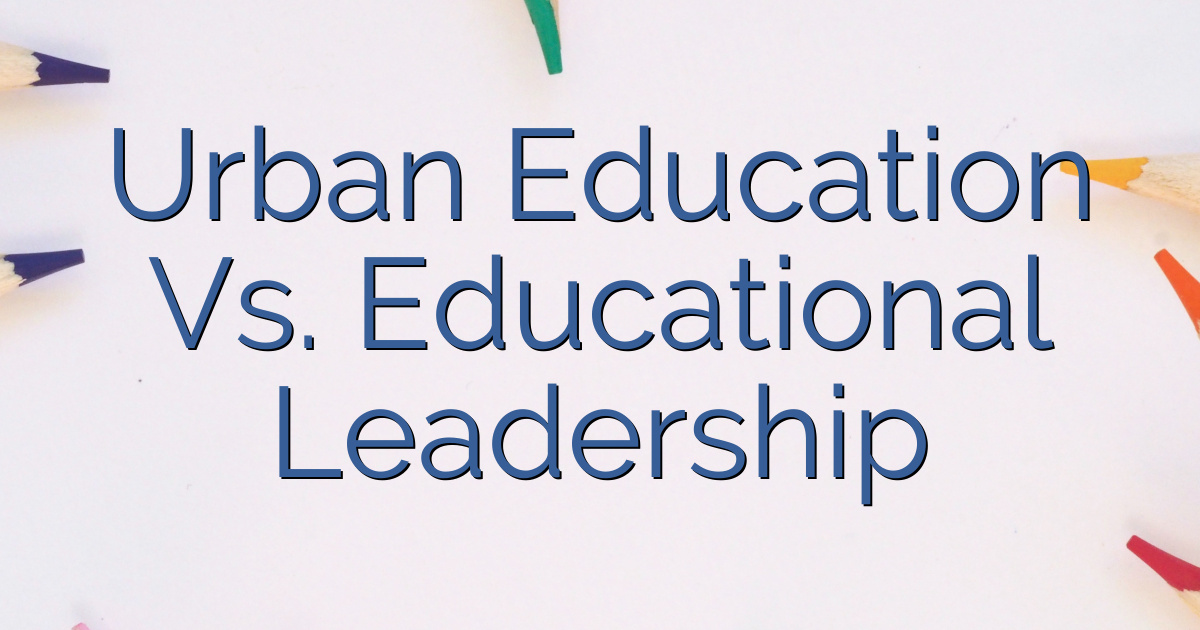 Looking to make a difference in the world of education? Explore the fascinating realms of Urban Education and Educational Leadership.
Dive into the diverse curriculums, assessments, and teaching methods that shape these majors. Discover the skills developed and the career opportunities available in both fields.
Compare salaries and consider the factors to weigh when choosing between Urban Education and Educational Leadership.
Let’s explore the similarities and differences, and find the perfect path for your passion and potential.
Looking to make a difference in the world of education? Explore the fascinating realms of Urban Education and Educational Leadership.
Dive into the diverse curriculums, assessments, and teaching methods that shape these majors. Discover the skills developed and the career opportunities available in both fields.
Compare salaries and consider the factors to weigh when choosing between Urban Education and Educational Leadership.
Let’s explore the similarities and differences, and find the perfect path for your passion and potential.
Table of Contents
Key Takeaways
- Urban Education and Educational Leadership both emphasize community engagement and addressing unique needs in education.
- Both majors provide specific knowledge and skills for urban education, focusing on engaging and educating students effectively through various teaching methods.
- Both fields require strong leadership qualities, adaptability, resilience, and commitment to equity and social justice.
- Career opportunities in Urban Education include roles such as classroom teachers, school counselors, and education consultants, while Educational Leadership prepares individuals for roles such as principals, school district administrators, and college faculty.
Overview of the two majors: Urban Education and Educational Leadership
The overview of the two majors, urban education and educational leadership, can be quite informative for prospective students. In urban education, community engagement plays a crucial role. It emphasizes the importance of connecting with the local community, understanding their unique needs, and implementing strategies that address those needs effectively. By fostering strong relationships with parents, community organizations, and other stakeholders, urban educators can create a supportive and inclusive learning environment. On the other hand, educational leadership focuses on the role of policy and advocacy. Leaders in this field work towards creating policies that promote equity, access, and quality education for all students. They advocate for resources, support, and opportunities that enable effective teaching and learning.Overview of the curriculum and requirements of the two majors
Both majors have distinct curricula and specific requirements. In the Urban Education program, the curriculum content focuses on understanding the challenges and opportunities in urban education settings. Courses cover topics such as cultural diversity, equity, and social justice. Program requirements include completing field experiences in urban schools and conducting research on urban educational issues. On the other hand, the Educational Leadership program emphasizes developing leadership skills for educational settings. The curriculum content includes courses on leadership theory, organizational management, and strategic planning. Program requirements involve completing internships in educational leadership positions and conducting research on effective leadership practices. Both majors offer valuable insights and skills for addressing the unique needs of urban education, but they approach it from different angles.- Urban Education:
- Cultural diversity
- Equity
- Social justice
- Field experiences in urban schools
- Educational Leadership:
- Leadership theory
- Organizational management
- Strategic planning
- Internships in educational leadership positions
Overview of coursework, assessments, and teaching methods
In both programs, you will engage in coursework, assessments, and teaching methods that prepare you for success in your chosen field. Assessment techniques used in both urban education and educational leadership programs vary, but are designed to measure your understanding and application of key concepts. These may include formative assessments such as quizzes, class discussions, and group projects, as well as summative assessments like exams and research papers. Teaching strategies in both programs focus on equipping you with the necessary skills to effectively engage and educate students. These strategies may include active learning, differentiated instruction, and the use of technology in the classroom.Comparison of Skills Developed in Urban Education and Educational Leadership Programs
To develop the necessary skills, you will engage in coursework and assessments that focus on practical applications and effective leadership strategies. In comparing the skills developed in urban education and educational leadership programs, there are several key differences to consider:- Urban Education Program:
- Emphasis on understanding the unique challenges and needs of urban schools and communities
- Focus on implementing culturally responsive teaching strategies
- Development of skills in community engagement and collaboration
- Educational Leadership Program:
- Emphasis on developing strong leadership and management skills
- Focus on strategic planning and decision-making
- Development of skills in organizational development and change management
Comparison of Career Opportunities and Job Roles in Urban Education and Educational Leadership Programs
When considering career opportunities and job roles, you can explore the distinct paths available in urban education and educational leadership programs. Urban education programs prepare individuals to work specifically in urban school settings, addressing the unique challenges and needs of students in these environments. On the other hand, educational leadership programs focus on developing skills in administration, policy-making, and organizational management in the field of education. Both paths offer rewarding opportunities for professionals passionate about making a difference in the education system.| Urban Education Programs | Educational Leadership Programs |
|---|---|
| Classroom teachers | Principals |
| School counselors | School district administrators |
| Education consultants | College or university faculty |
| Program coordinators | Education policy analysts |
Salary potential in Urban Education and Educational Leadership programs
In terms of salary potential, both urban education and educational leadership programs offer promising opportunities. According to recent data, individuals with a background in educational leadership tend to earn higher salaries compared to those in urban education positions. This is primarily due to the increased level of responsibility and leadership required in educational leadership roles. On average, educational leaders, such as principals and superintendents, can expect to earn a higher salary than teachers in urban education settings. However, it is important to note that salary potential can vary depending on factors such as location, experience, and qualifications. While salary is an important factor to consider when choosing a career path, it is equally crucial to prioritize job satisfaction. Ultimately, individuals should aim for a balance between financial stability and personal fulfillment in their chosen field.Similarities between Urban Education and Educational Leadership
There are many similarities between urban education and educational leadership programs. Both fields require individuals who possess strong leadership qualities and are able to navigate the challenges faced in urban education. In order to effectively address these challenges, educational leaders must possess qualities such as adaptability, resilience, and a commitment to equity and social justice. They need to be able to create a positive and inclusive learning environment for all students, regardless of their background or socioeconomic status. Additionally, educational leaders must be skilled in strategic planning, collaboration, and effective communication. To further illustrate the similarities between urban education and educational leadership, consider the following table:| Challenges Faced in Urban Education | Leadership Qualities in Educational Leadership |
|---|---|
| Limited resources | Adaptability |
| High student diversity | Resilience |
| Achievement gaps | Commitment to equity and social justice |
| Language barriers | Inclusive leadership |
| Community engagement | Strategic planning |
| Teacher turnover | Collaboration |
Difference between Urban Education and Educational Leadership programs
To understand the difference between urban education and educational leadership programs, you should consider the unique focuses and skills required in each field. Urban education programs are designed to prepare educators to work in diverse and often under-resourced urban schools. These programs provide training in culturally responsive teaching, equity, and social justice. On the other hand, educational leadership programs focus on developing the skills needed to lead educational institutions effectively. These programs emphasize organizational management, strategic planning, and policy development. In terms of career prospects, graduates of urban education programs can pursue careers as teachers, administrators, or policymakers in urban schools or districts. They may work to address the specific challenges faced in urban education, such as achievement gaps, high teacher turnover rates, and inadequate resources. However, educational leadership programs provide graduates with the skills necessary to lead educational institutions at all levels, including schools, districts, and even state departments of education. The career prospects for educational leadership graduates include positions such as principals, superintendents, and education consultants. Both urban education and educational leadership programs face unique challenges. In urban education, educators often encounter limited resources, overcrowded classrooms, and complex social issues that impact student learning. They must also navigate cultural and linguistic diversity among their students. Educational leadership programs, on the other hand, face challenges in preparing leaders who can effectively address the complex issues facing educational institutions, such as budget constraints, changing policies, and the need for continuous improvement.Factors to consider when choosing between the two majors: location
When choosing between the two majors, you should consider factors such as location, which can greatly impact your experience and opportunities in the field. Here are a few factors to consider:- Urban Education Programs:
- Pros:
- Exposure to diverse student populations and cultures, providing a rich learning experience.
- Access to a wide range of resources and support systems within urban communities.
- Opportunities to address social justice issues and make a positive impact on underprivileged communities.
- Cons:
- Higher cost of living in urban areas may affect your financial stability.
- Limited job opportunities in certain urban areas, leading to increased competition.
- Dealing with challenges such as overcrowded classrooms and limited resources.
- Educational Leadership Programs:
- Pros:
- Development of leadership skills that can be applied in various educational settings.
- Higher job prospects and opportunities for advancement in educational leadership roles.
- Ability to shape policies and make systemic changes in the education field.
- Cons:
- Limited exposure to the unique challenges faced in urban education settings.
- Less hands-on experience working directly with students.
- Possibility of being disconnected from the day-to-day realities of the classroom.
Are skills in real estate transferable to urban planning in terms of educational leadership?
The real estate urban planning comparison shows that skills in real estate can be transferable to urban planning, especially in terms of educational leadership. Both fields require strong negotiation, problem-solving, and management skills, making professionals with real estate experience well-suited for leadership roles in urban planning education.
How does Environmental Education differ from Urban Education in terms of Educational Leadership?
Environmental education focuses on teaching about conservation and sustainability, often involving outdoor activities to connect students with nature. Urban education, on the other hand, prioritizes addressing the unique challenges of city living. Educational leadership in outdoor vs environmental education requires different approaches to align with these distinct learning environments.

